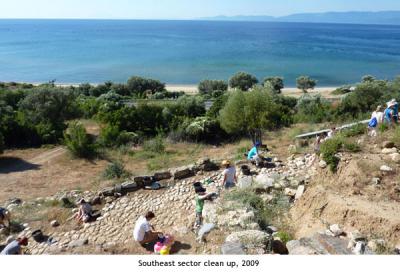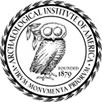Jacques Perreault
Tuesday, February 22, 2011 at 4:30 P.M.
Yale University, Phelps Hall, Room 407
Solow Lecture
 Since 1992, Greek and Canadian archaeologists have been excavating one of the earliest Greek colonies in the Northern Aegean. Founded in 655/654 B.C., Argilos rapidly became a flourishing city which benefited from its trading activities in a region rich in gold and silver mines. The excavations have uncovered surprisingly well-preserved houses and public buildings, some with walls up to 4 meters tall. The rich finds attest to its relations with the Thracian tribes, the Macedonians, the Persians, and other colonial Greeks in the region. The economic life of the city suffered from the foundation of the Athenian colony of Amphipolis in 437 B.C. and was finally destroyed by Philipp II in 357 B.C. Historians thought that the city was then abandoned, but our excavations have brought to light an important agricultural settlement on the acropolis, which dates to the years 350-200 B.C. The relatively short lifespan of this colony has helped preserve its early architecture, which offers a unique possibility to study the development of colonial urbanization. This lecture will present the discoveries made on the site.
Since 1992, Greek and Canadian archaeologists have been excavating one of the earliest Greek colonies in the Northern Aegean. Founded in 655/654 B.C., Argilos rapidly became a flourishing city which benefited from its trading activities in a region rich in gold and silver mines. The excavations have uncovered surprisingly well-preserved houses and public buildings, some with walls up to 4 meters tall. The rich finds attest to its relations with the Thracian tribes, the Macedonians, the Persians, and other colonial Greeks in the region. The economic life of the city suffered from the foundation of the Athenian colony of Amphipolis in 437 B.C. and was finally destroyed by Philipp II in 357 B.C. Historians thought that the city was then abandoned, but our excavations have brought to light an important agricultural settlement on the acropolis, which dates to the years 350-200 B.C. The relatively short lifespan of this colony has helped preserve its early architecture, which offers a unique possibility to study the development of colonial urbanization. This lecture will present the discoveries made on the site.
 Jacques Perreault is Professor of Greek Archaeology with the University of Montreal, and holds his degrees from Universite Laval in Quebec (B.A. and M.A.) and Ecole des Hautes Studes en Sciences Sociales in Paris (Ph.D.). He has been a Visiting Professor at the University of Nice, and the Australian Archaeological Institute. His areas of specialization are Greek pottery, colonization, and trade and contacts between the ancient Greeks and non-Greeks. Since 1992 he has been co-director of Greek-Canadian excavations at ancient Argilos, and Director of Canadian excavations at Ras el Bassit in Syria.
Jacques Perreault is Professor of Greek Archaeology with the University of Montreal, and holds his degrees from Universite Laval in Quebec (B.A. and M.A.) and Ecole des Hautes Studes en Sciences Sociales in Paris (Ph.D.). He has been a Visiting Professor at the University of Nice, and the Australian Archaeological Institute. His areas of specialization are Greek pottery, colonization, and trade and contacts between the ancient Greeks and non-Greeks. Since 1992 he has been co-director of Greek-Canadian excavations at ancient Argilos, and Director of Canadian excavations at Ras el Bassit in Syria.
For More Information on Lecture Topic:
